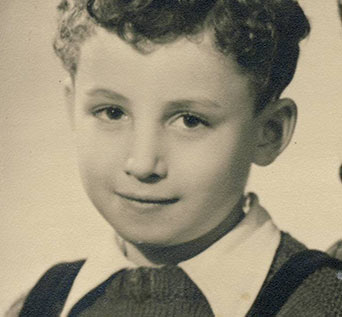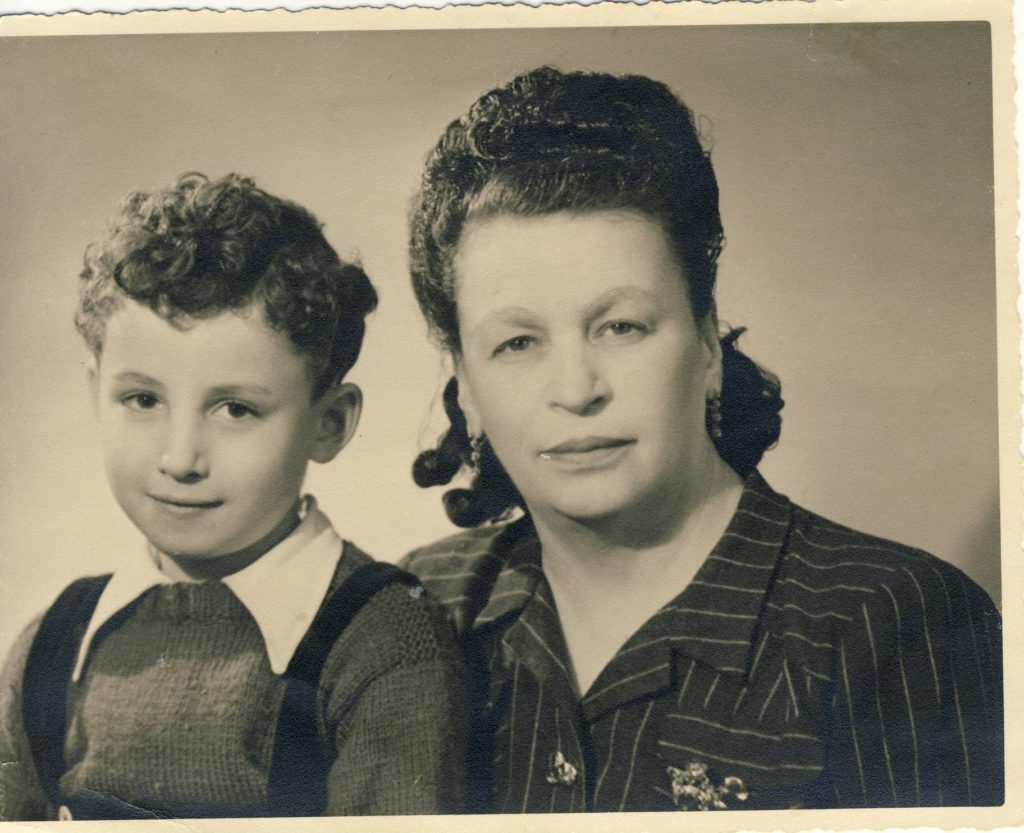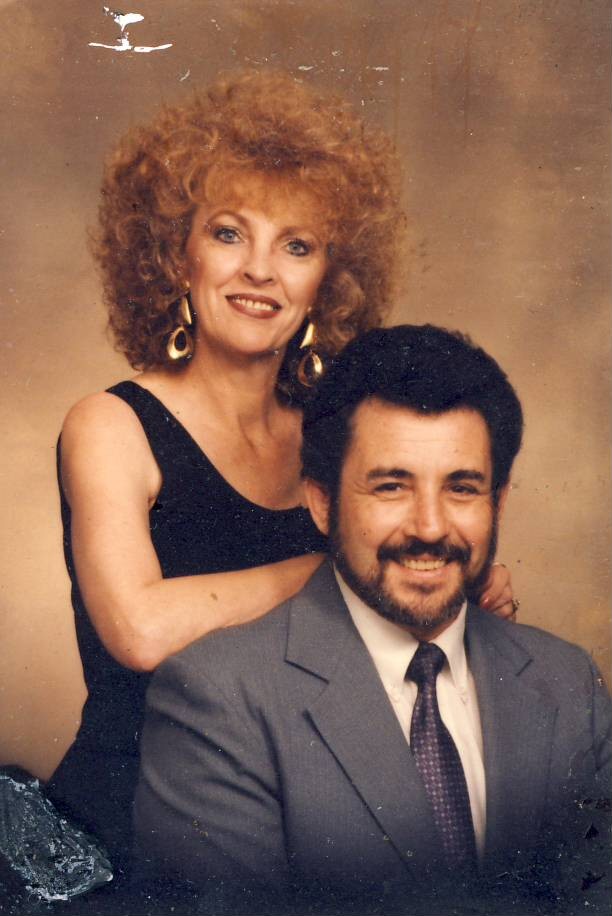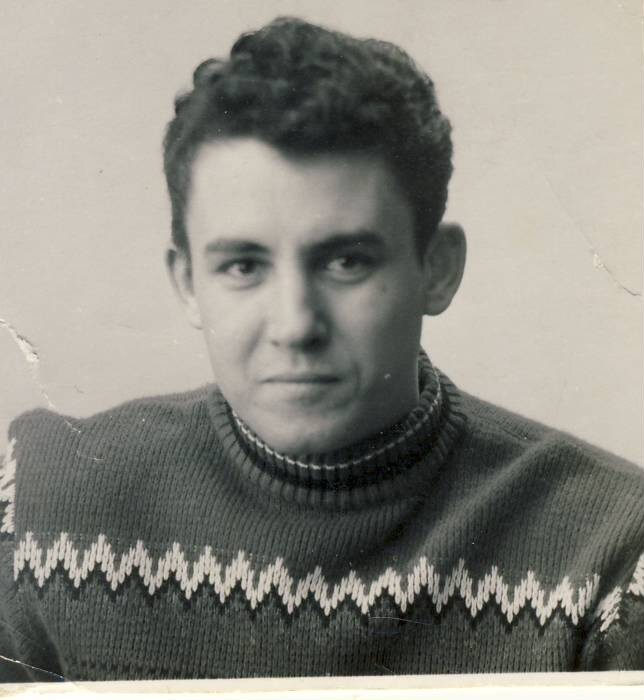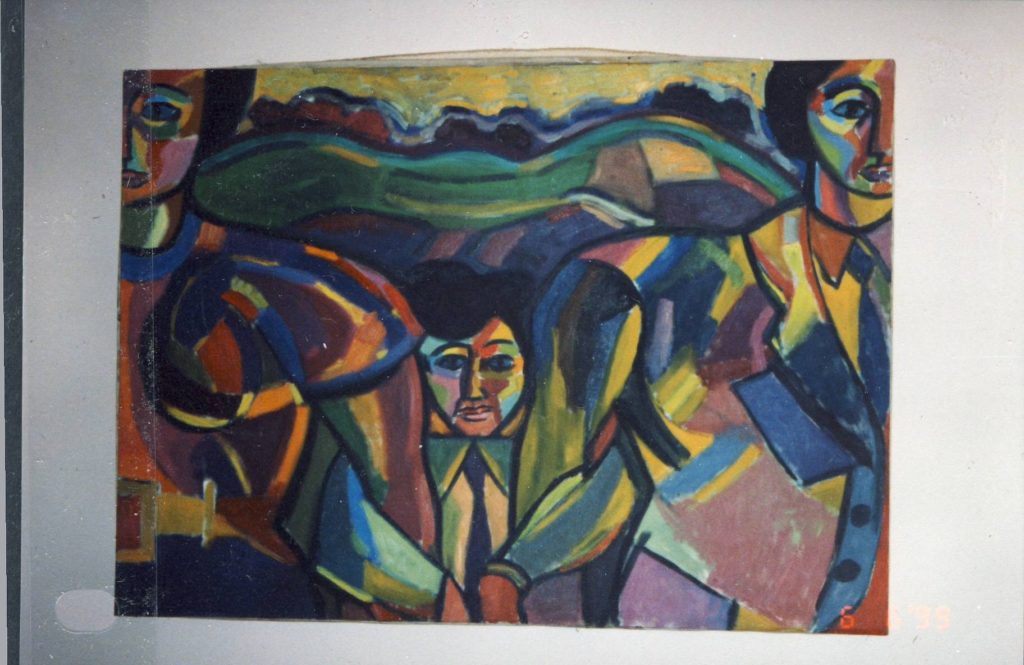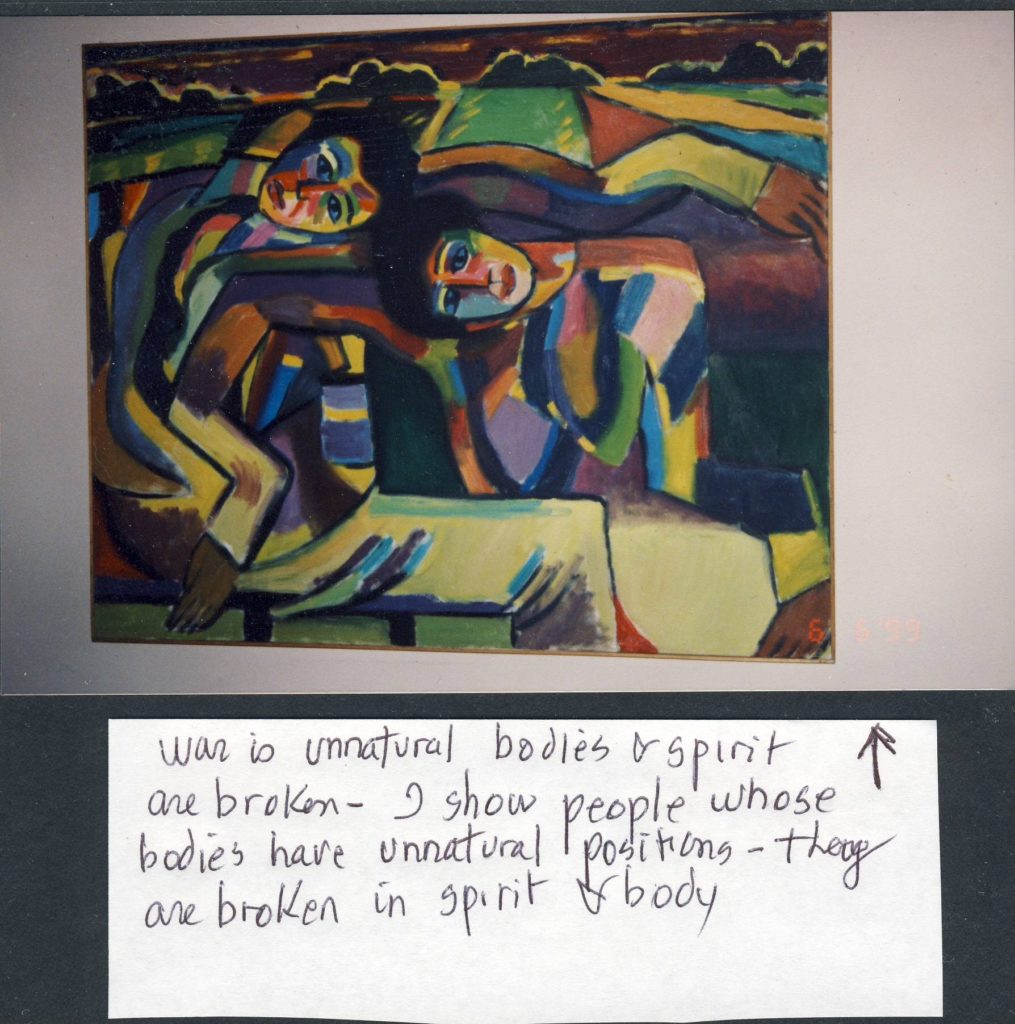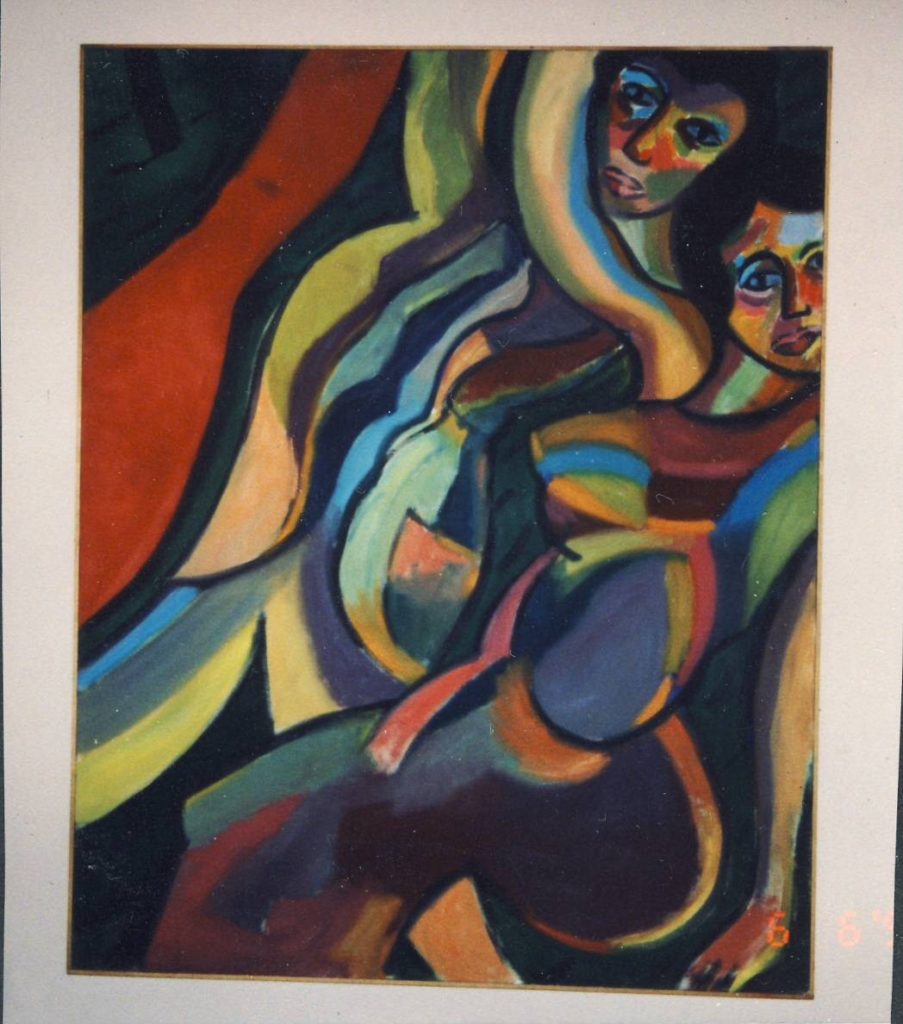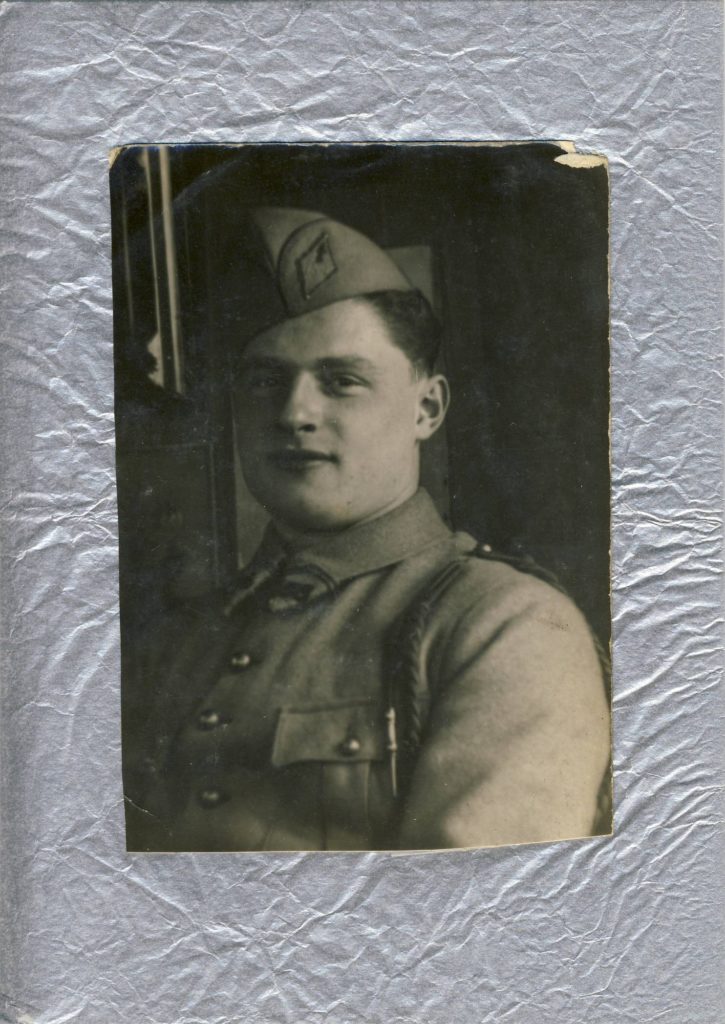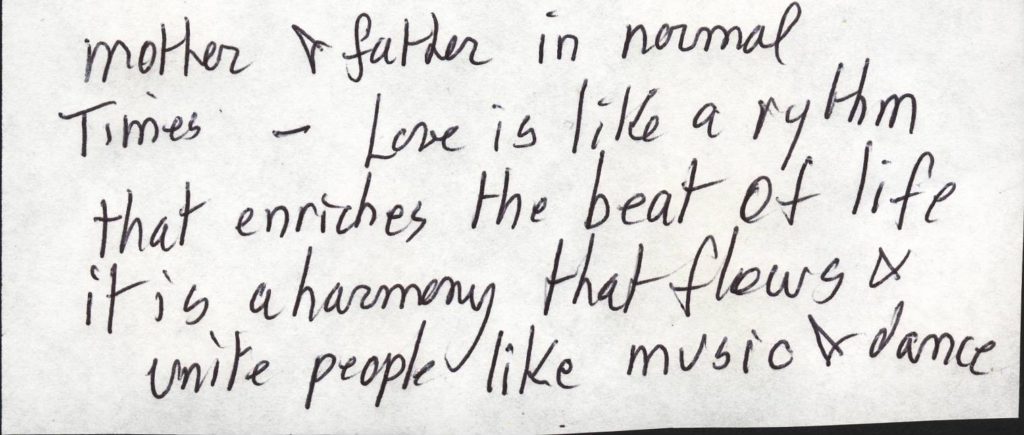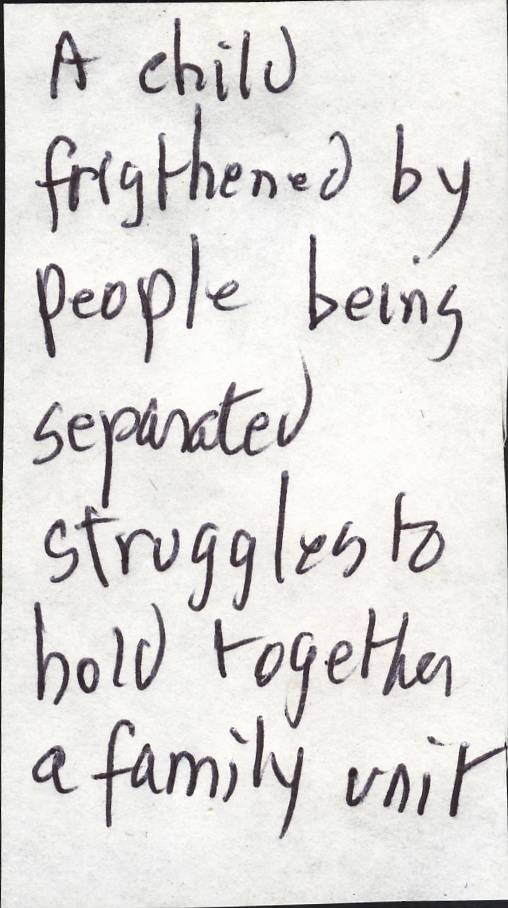PRINCE: Claude, is there some place special where you want to begin?
KRUCHMAR: I’ll begin in Paris because that’s where I started.
PRINCE: That’s where you started. I suppose maybe, if you want to give your date of birth.
KRUCHMAR: August 3rd, 1937
PRINCE: What do you remember?
KRUCHMAR: Germany was occupying Paris, I remember the anxiety because all of a sudden we were not allowed to go outside after 4 o’clock and they had, we were putting blankets on our windows. There was no lights, no nothing. And I could see at 4 o’clock people were running around on the street like they were running for their lives because at 4 o’clock if you were on the subway, you stayed there the whole night. So, you didn’t have didn’t have permission to be after curfew. If you were caught after curfew, then you were in trouble. They would take you to the German Police Station, and you may not come back. A lot of people that got taken to Police Station never came back. The first recollection I remember is I had to wear a star. And they issued us rules for the stars and it said ‘Juif’ which means Jews. And my grandmother told me that I should never walk around the street with a star exposed and when I went to school, I’d take a book and cover it. So, (small laugh) that’s what I did.
PRINCE: Who did you live with?
KRUCHMAR: My grandmother
PRINCE: Your grandmother. Do you remember what you felt or what you thought about?
KRUCHMAR: I didn’t think nothing at the time because I was only 5 years old. But I did what she told me and I had sort of a sixth sense to know that something was going on because everybody was afraid. You could feel the fear, don’t know why, but there was constant anxiety. Her and my father used to argue because, he didn’t want to put it on. He was not ashamed to be Jewish, but he was going to be one of these guys that was smart enough to understand that if you had that you could be picked off the street quite easily, but if you didn’t have it and they picked you up, you broke the law, so either way you couldn’t win. So he didn’t want to wear it, and he didn’t. Jews were not allowed to travel and it worked
PRINCE: So with your grandmother was your father and
KRUCHMAR: (cuts in) father and me and my grandmother. We lived in this apartment. The first thing I noticed is that number one, they took his shop away from him, you’re not allowed to work so they took same thing happened to my uncle, he had an antique shop. They didn’t issue a license. They took his shop and gave it to somebody else who was non-Jewish. Yeah, they took all your property and all your means of making a living. So my father was forced to make and cut clothes in his home. Yeah, we took the big cutting table and we put it in our apartment. That’s where we slept. (PAUSES, SEARCHING FOR WORDS) Next thing I remember is, I don’t know if it was the French Police or Gestapo but somebody came in the apartment and matter of fact, the guy put me on his knees, I was playing with his handcuffs I don’t know who he was. But they were looking for my father. That was 1943, and then the night they caught him, I remember because my grandmother spent the whole night in the police station and (CHUCKLE) I’m sitting in this dark apartment all night wondering where everybody is.
PRINCE: You were alone?
KRUCHMAR: Yeah, and see once they took you never came back. Well, what my grandmother tried to do was buy him off. She was unable to do so. My father was divorced and dated a non-Jewish girl and this guy, well her father, was a fireman for the city of Paris and turned him in. That’s that simple. Now they caught him without his star.
He was working, I don’t know (MOMENTARY STUTTER) he told him the whole story. he didn’t want my father to go with his daughter and basically turned him in. so they took him to the police station and (SHORT PAUSE) after that, one day we came home and (INHALE, HEAVY SIGH, DEEP BREATHS) stupid…
PRINCE: No, it’s not stupid.
KRUCHMAR: (LONG PAUSE, SNIFFLE)
PRINCE: Let me get you some Kleenex.
KRUCHMAR: (CRYING AND AFTER A LONG PAUSE:) Anyway, we come back home the next day and the Gestapo seal on the door (PAUSE) Then…
PRINCE: The seal on the door?
KRUCHMAR: There was a seal, a wax seal. What they did was they put a wax seal, and if you broke the seal they knew you’d been back. So my grandmother and I were somewhere, I don’t know what happened, we came back home the Gestapo seal was on there (tape disruption) So we didn’t dare break the seal. We wanted them to think that we had gone away. There was nowhere to go because the train station, everything was, you had to have papers. So, the lady downstairs who took care of the building, ah (PAUSES, SNIFFLES) she hid us in an attic for 3 weeks, yeah.
PRINCE: Your grandmother also?
KRUCHMAR: Yeah, so we stayed in the attic for 3 weeks and then my grandmother decided it wasn’t safe, sooner or later we’d get caught. So what she did, she arranged for her to go to work for a Jewish orphanage. But she had enough sense to know that they going to get caught there too, so instead of putting me in a Jewish orphanage, she put me in a, I went to a Cub Scout organization and they had priests that worked to save Jewish children. We were in a Catholic School, and there was nothing but Jews in there. And that’s where they put us. So, what you got to remember in Paris that the Gestapo or the German Police, whatever, had several visits. One of them, they wanted all the blankets and radios for the Russian front that was 1943. And on the other hand, they would check the register and they checked the name. They knew exactly who was in there and they could pick you up at random because they knew how many Jews lived in that building because we had to be declared unless you changed your name. Now my aunt and uncle that lived a couple blocks away, they didn’t have the right name. They changed the name. You could buy and falsify papers. And they would make pretty good, but the Germans are pretty smart. A lot of times they found you out that there was false papers. And so she put me in this little town in __((Capis??)??)???_________ and it was (SHORT PAUSE) like an orphanage. There was just kids. There was a cook and made meals and you were left on your own most of the time, you know, because there was not that many people to take care of you. But the food down there was horrendous and the meat smelled so bad, I couldn’t hardly taste it. And so lot of the time we were hungry because there was nothing to eat, so we’d go out in the fields and pick up wheat and let’s see, I used to have some flowers and seed taste good so I eat somebody’s flowers and then pick up onions after the harvest. And the only reason I went to school was at 4 o’clock the teacher would give us a bar of chocolate at 4 o’clock (LAUGHS). We had to walk about 3, 4 miles to go to school. There was no buses. And it was a one-room schoolhouse and what I remember the most, is that one year I spent in (name of city mentioned before) possibly caused me most harm, emotionally, more than anything I’ve gone through because of the separation from my parents. I mean I was hungry all the time, but I was terribly lonely and the isolation from my family, left a mark that never left me, fifty years later, I can still remember. So, (PAUSE) anyways as far as the years of the occupation, I mean what do you want to do? You didn’t work. You were scared 90 percent of the time. You see your friends one by one they ____________. An uncle and an aunt, she was in a wheelchair, and she went first.
PRINCE: When you say she went first
KRUCHMAR: Well, the got her before they got everybody else and they got my father. See, once they got a member of your family, they got everybody. That’s a question going down the list so, I had an uncle, my father’s brother was in the army, he got caught. He spent 6 years in a ___________________ and 4 years on a _______German_Prisoner of War Camp_______ . His buddies that were with him protected his identity, they never found out he was Jewish, so he survived the war.
PRINCE: Where was your mother?
KRUCHMAR: My mother divorced my father, she was in unoccupied France but unoccupied France lasted for awhile until there was an invasion. Then what the Germans did, they occupied Southern France. So, then they came after her and I think the Gestapo missed her by 2 days. She kept one hop, she went one place after the other. They were really close on the trail, I don’t know how they got there. But when she went to Paris, and the first time I saw my mother the Germans still had, still were occupying the area and she introduced herself as my aunt. Now, why she introduced myself, I never saw her before until I was 7 years old. So my first instinct was to run away and I ran and got lost somewhere and then she told me she was my aunt so okay, she took me out to dinner and I was so hungry I ate about 3 plates of spaghetti and I got sick for the next 4 days. That’s the last I’ve seen of her. She saw me one time
PRINCE: Did she tell you before you left her that she was your mother?
KRUCHMAR: No, she told me she was my aunt. That’s all that she said (PAUSE) I didn’t know I had a mother (PAUSE)
PRINCE: Did she make you aware of it then? Or did she leave?
KRUCHMAR: She told me that she was my aunt and to tell everybody that she was my aunt and that’s all she could tell me and that was it. So, that’s the first time I met her, I was 7
PRINCE: and you believed that, that she was your aunt?
KRUCHMAR: I told her She didn’t look like my aunt, tante Simone.Came out of nowhere, I don’t know who you are
PRINCE: How did you get together? Who brought you to her?
KRUCHMAR: I don’t know how she found me. My grandmother, I had an aunt, no an uncle, was a distant cousin of my mother. My grandmother knew that we were in trouble, so she said if something happens to me. See the people, what it is, the survivors, they would tell others, the people that didn’t survive would have made arrangements with other people to take care of the children. So she made my aunt promise that if anything happened to her that she would take care of me. So my aunt promised her that. My uncle survived for one reason, first of all they were very good at having a system for survival. If they would go home or they would go anywhere one would walk on one side of the street and one on the other so if one got the other one wouldn’t come home because that’s how they caught you, they caught you both together. So they had a ________system of survival worked out between them. And their name was Bersous which is as French as you can get. And there’s a lady called Abraham and the Gestapo searched and registered, they would go from house to house. And they’d look on all the Jews, Abraham so they went on the 5th floor and accused her of being Jewish, she was as French as can be and Catholic as can be. So she said, I’m not a __________ but if you want a Jew, you go over the next door and they’re Jewish. So, they knocked on my aunt’s door and aunt threatened to put my uncle’s pants down to prove that he wasn’t circumcised. Well apparently it turned the stomach of the guy that was there, he didn’t take her up on it and that’s how she lived.
PRINCE: And he could have been or not could have been.
KRUCHMAR: yeah __the guy___________
PRINCE: and left him.
KRUCHMAR: yeah, they left him.
PRINCE: Tell me about your grandmother
KRUCHMAR: Well, my grandmother, she must have been in her fifties. (PAUSES) well I was very close to my grandmother, she’s a good cook (LAUGHS) she was an excellent housekeeper and I went from a beautiful home and good meals to a dump where the kid above me urinated on me all night, never changed the beds, and we take our beds and we stunk. We stuck them out the window, it stunk so bad, you could smell that place 6 miles away but we survived. Covered with fleas and the kids didn’t have handkerchiefs so they used to blow their nose in my clothes. I go to put my coat on and it was full of (SEARCHES FOR WORD)
PRINCE: mucous?
KRUCHMAR: Yeah, I can’t tell you what a nightmare that place was, and I was one of the lucky ones. (SIGHS)
PRINCE: Why was that?
KRUCHMAR: Well because, I was one of the lucky ones because there was a Jewish orphanage up the street and my uncle lived there. That’s my uncle from my mother’s side. As many uncles I got, I don’t think I have one left and he was, I don’t know if he was a janitor. He wasn’t allowed to keep his business but the Jewish organization; they would give him a job. So he worked on an orphanage. He loved kids. So he went to work 8 o’clock in the morning, there wasn’t a soul in the place. He was in the office, he found a 13 year old kid hiding under the desk, so he asked him what happened. He said, 3 o’clock in the morning the Germans came in the front door, they encircled the place and ask everybody to step outside and that’s the only kid that lived. So he was crying like a baby when he came home. So that’s the reason I said it, my grandmother went to work for a Jewish organization and they were warned about the Germans coming over. She had to go back and get her belongings and that’s how they caught her.
PRINCE: This grandmother was your father’s mother?
KRUCHMAR: yeah, I think it was Auschwitz
PRINCE: Your grandmother?
KRUCHMAR: Yeah, and my father too.
PRINCE: Do you want to talk about that?
KRUCHMAR: They got my father in 1943 and by the time they got him, he already knew there were extermination camp because the word had got out. There’s not a work camp. Everybody thought at first that was a work camp. And somebody either got out or word got out, but we knew there were extermination camps. My father got caught, my grandmother I don’t think lasted because she was over the age where she, if you had grey hair and you didn’t look like you could work hard, they put you to the left and you went right to the gas chamber. And my father last 6 months and what he did (LOUD SIGH, CRYING) he traded food for cigarettes and he gave up
PRINCE: Oh, he smoked.
KRUCHMAR: He thought there was no way out, so he traded food for cigarettes. And I found that out from somebody who came and knew him from my neighborhood came back and told us that. He didn’t tell me that, I just overheard it.
PRINCE: What was your father’s name?
KRUCHMAR: Henri
PRINCE: and this is the name you were given at birth, Claude?
KRUCHMAR: Claude, yeah. Claude Rene Kruchmar. They put another initial to disguise my Jewish origin. So Jews didn’t have middle initials. So they put down…well anyway the kids who were in that school, I think most of them were Jews. They were from the same neighborhood, matter of fact.
PRINCE: And it was supposed to be Catholic?
KRUCHMAR: It was a Catholic organization. We went to church on Sunday and the priest ran it.
PRINCE: but not very well.
KRUCHMAR: Well there was not too much he could do. There was no money, there was no food. I remember a cook. I don’t remember any supervision at all. But it was very lonely. I mean you save your life. If I could spend one year in misery, you save your life that was something.
PRINCE: Do you remember any nuns?
KRUCHMAR: There were no nuns. I remember this cook. We’re talking 1943.
PRINCE: Did you cry?
KRUCHMAR: Never cried a tear. Never then.
PRINCE: Never then.
KRUCHMAR: Never then.
PRINCE: Had you cried as a child before?
KRUCHMAR: No I didn’t.
PRINCE: You were saving it?
KRUCHMAR: I don’t know if I was saving it (LAUGHS) I knew one thing. I was in terrible, terrible pain, emotional pain, it was on 24 hours a day. And I was living a nightmare, matter of fact the when I got out of that place I had horrible dreams for a long time. Something about railroad tracks and something inside of me that was twisted all the time. That’s all I can remember. And I woke up petrified. And this was after I came out of that place.
PRINCE: Tell me about a day there. Who woke you?
KRUCHMAR: Early in the morning, so I could go to school, I guess. I remember never eating breakfast, I don’t think there was anything. We knew that there was something going on because first of all the Germans came into our village, they came right on the school ground, they suspected that the Priests was hiding Jewish kids. For some reason _____________courtyards, they looking for numbers. So none of us had numbers and they pounded that poor guy for 2 days and they beat the daylights out of him. That’s how we know, we never saw him again. To this day, I don’t know what happened to him. But they had their cooking gear, everything, they occupied the place. And all of a sudden, we got up one morning and there was no Germans (LAUGHS). So we looked ________________they must have been on their last leg because they had potatoes and were making chocolate pudding? And potatoes. I guess they had nothing to eat too. So while we ate like pigs, we took all their stuff and ate. There was like a 2 day lull, and then after that it seemed like, I never heard such noise in my life. It was like artillery was constant and for 7 days, the artillery bombardment was going on day and night. I mean, all we were was in a basement. We couldn’t even go outside. I went to the bathroom one night, and a bullet went through the door, I mean the window and ricocheted inside. I went back to bed and urinated on my bed. To hell with this, I mean you know they were, the bullets were coming in the building. So they put us in the basement, after one week we stayed in the basement and that noise was going on constantly.
PRINCE: They. Who is they?
KRUCHMAR: Day and night. Whoever was there. I have no memory of adults at all. None. So we stayed in the basement. But I remember one thing we ate is we had a bowl of water, with some sugar and wheat and that was the meal. That was what we had, that was all we had.
PRINCE: You were a child, who were the other children around you, do you remember any of them?
KRUCHMAR: I remember one guy specifically because he was blind and his brother wasn’t. and the blind brother was 14 years old and the other was 7 and wherever he went, the other blind kid would always put his hand on his shoulder. That’s the only thing I remember.
PRINCE: What did you do? Did you play games?
KRUCHMAR: Let’s see. Whatever we did, I was always looking for food, that’s all I can tell you. So, every time you saw a farmer that would cut his wheat he grow on the field and see if you can get some _______________falling off. I just remember being hungry all the time, that’s all.
PRINCE: Do you remember, at that time, anybody being particularly nice to you or kind to you?
KRUCHMAR: Oh no.
PRINCE: was it more just ignoring?
KRUCHMAR: You just didn’t have anybody there. It was just a place to keep you and feed you, and that was it.
PRINCE: Never a hand on your shoulder?
KRUCHMAR: If they did, I don’t remember. I do remember one spring when I was on my way to school and they had the apple was in bloom and the air was full of spring. And perfume and it smelled, apple blossom. I’ve never been in such pain in all my life, that’s all I can remember. So at 7 years old and I told myself, I said, boy life is really hard.
PRINCE: Had you felt care and love before?
KRUCHMAR: Oh yeah. I went from a very close environment to nothing. I mean that’s terrible to make an adult of a 7 year old, you know.
PRINCE: Did the other children, did you all talk about your homes?
KRUCHMAR: There was one kid in my neighborhood that I remember talking to, I don’t know the others. I have no memories.
PRINCE: When you went to school?
KRUCHMAR: When I went to school, I didn’t know what the hell was going on. I couldn’t care less, I sat in the back of the room. It was a one-room schoolhouse and it was 6 grades there, 6, or 7 or 8 grade. And the teacher came to me once a day and I don’t know what the hell she was babbling about because I didn’t understand it. So, I came there for a chocolate bar and that was it.
PRINCE: You said you saw your father taken away?
KRUCHMAR: Yes, I did see my father taken away. The Gestapo came to my house and like I said, they kept looking for him. But the night they caught him, I remember distinctly because my grandmother spent the night in a prison that was right down the road from us. They took over a French Police Station. French people a lot of anti-semitism going on over there because in my school, the one I went to high school, I started out after the liberation, they were selling Jewish kids for 500 francs a head.
PRINCE: After liberation?
KRUCHMAR: No, before. But we got the word after because after France was liberated the same professors that were teaching school then came in the class and shot these guys dead, by the door right in the room. They shot these kids dead. The ones that were not___________. They knew who they were. There was a lot of atrocities being committed on both sides. And when they caught them ____________they just throw them off the sixth storey. That’s the French. They threw __________with their belongings and everything. They even____________________quite a bit.
PRINCE: You saw your mother who was your aunt, this was after you spent the year in that school. When she left you, who were you with? Where did you live?
KRUCHMAR: Capi.
PRINCE: When did you leave Capi?
KRUCHMAR: August 1944, the whole American invasion came through our village, or part of it came through our village. That was the noise I told you about. So for 7 days and 7 nights, they had this artillery barrage and it was in small______________________. You name it, I don’t know what happened. There was a battle on the plateau, I remember anti-aircraft positions up there because we used to see them. But when this was over and done with, there wasn’t a living thing standing up. I mean, they obliterated trees, there was nothing. I was telling Carol, I was on my way to school one day, I could smell something dead, but I didn’t know what it was and I was scared to death. And I stepped on something and it was a man’s face that collapsed _______________. You know the flesh gets gray when people die and I had that stuff stuck on my feet and I couldn’t knock it off. And then I ran to try to outrun the smell, but I could not outrun the smell. I don’t know what I did. I must have must have taken my foot and washed in the river or something.
PRINCE: Where you screaming?
KRUCHMAR: Oh, I was a maniac. (PAUSES) You could smell death all over the place (PAUSES) I had some funny impressions as a kid. I remember going by a cemetery and I kept thinking that when you die you never come back and you never see your mom and dad and you’re terribly alone and that’s the end. So I was terrified of death.
PRINCE: Did you meet any Americans at that time?
KRUCHMAR: Yeah, they came down in our courtyard. Somebody said, I was in my bedroom, and somebody said the Americans are here. So I ran outside because I expected them to ride in on a horse and I saw this great big guy come out of a tank and he was throwing us some little packages. We were all hungry, so we were eating them. And I told myself, this is the hardest to swallow I ever ate and it was gum. I swallowed 5 pieces before I finally got the idea, you don’t take the gum and swallow it. But when the Americans came, we used to take their packages and we scraped the wax to make candles and we used all the products they would throw away to do things. But when they came in 1944, all I can remember, I’m in the truck and we’re going to Paris, going back to Paris, and Paris was already liberated for 3 weeks so we go in this neighborhood and all of a sudden the machine gun _________________________it was some idiot still stuck up there, they found him. Anyway, we go back to Paris and I don’t go back to my grandmother. I find myself with my aunt and all I can remember is she told me to take all my clothes and take them in the corner and she burned them because they was full of fleas. Get my head out of here. I was covered with lice and fleas, to me that was normal. So when I came back, that was it. To me that was normal but to them, it wasn’t.
PRINCE: And that aunt and uncle were still there?
KRUCHMAR: Yeah, the ones that had survived.
PRINCE: You said you had funny impressions of death
KRUCHMAR: Oh, you knew there were people dying all the time. You knew what was going on. I was 5, 7 years old, but I wasn’t sleeping because you hear it all the time. There was a war going on. I knew what a war was.
PRINCE: Did you know what peace was?
KRUCHMAR: Well, I didn’t remember too much for peace because when war started in 1941, I must have been 4 years old. And 1939 for us. But they had the phony war going on first nothing was going on, everybody was laughing. People went up in the front and nothing was happening for a number of weeks, so the called it the phony war but they didn’t turn phony for long.
PRINCE: Could you understand that the people didn’t leave you because they wanted to?
KRUCHMAR: I knew my grandmother was hiding me out. I knew that and I remember when she took me to be put in Capi I didn’t know that was going to be the last time I see her, I just knew I was being hidden out. And I was told not to reveal anything about anything. But the kids knew pretty well, because you could feel the anxiety, not knowing what was going on but the anxiety was really, really oppressive. Every adult you knew was anxious, they had tremendous fear. Normal people that you normally remember before the war that were easygoing people, everybody was uptight. And we listened to the news from London, this was illegal, everybody did it. There wasn’t a person in Paris that didn’t. So you listened to the ______________ to find out what was really happening.
PRINCE: Listened to the what?
KRUCHMAR: The news from London.
PRINCE: You said a word
KRUCHMAR: That it was illegal to have radio.
PRINCE: I thought there was some word I couldn’t understand.
KRUCHMAR: Everybody knew what was going on because you could have a radio but you couldn’t listen to none of the news. So we got news from what the Germans were doing primarily what was happening all over the world. And the news in 1943, they weren’t very good. A lot of people were very upset. But they had one main meal in Paris, at 12 o’clock you could walk on any street in any neighborhood and all you smell is mashed potatoes. That’s all we had. You could smell it all over. Then we had beans, there was no dairy products whatsoever. There was meat, was a rarity. But mashed potatoes, by God you had them morning, noon, and night. And my grandmother had all kinds of different ways to make different things out of potatoes.
PRINCE: This was before?
KRUCHMAR: This was during, before World War. It was during the War.
PRINCE: Before she hid you?
KRUCHMAR: Yeah
PRINCE: Who told you about your grandmother?
KRUCHMAR: I can’t put my finger on it, I knew. Nobody told me, but it was obvious to me. I came back, I went to my aunt’s house, nobody would tell me


